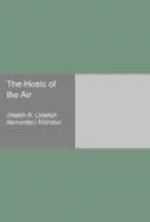Peeping above the snow he saw about fifty German infantrymen walk down the road toward the river, their heavy boots crunching in the snow. They were stalwart, ruddy fellows, boys of twenty-one or two—he knew now that boys did most of the world’s fighting—and he liked their simple, honest faces. He felt anew that he did not hate the German people; instead he felt friendship for them, but he did hate more intensely than ever the medieval emperors and the little group of madmen about them who, almost without warning, could devote millions to slaughter. An intense democrat in the beginning and becoming more intense in the furnace of war, he believed that the young German peasants coming down the road would have much more chance before the Judgment Seat than the princes and generals who so lightly sent them there.
The soldiers went on a little distance beyond the edge of the town. The cessation of the snow and the brilliant moonlight enabled them to see far into the plain below, where the hospital camp lay. John, looking in the same direction, saw little wisps of smoke rising above the blur of the camp, but the distance was too great for him to detect anything else.
The low note of the trumpet called to the young troops, and they turned back into the town. John rose from his covert, brushed the snow from his clothing, beat his chest with his fists, and increased the circulation which would warm his body anew. Then he stood against the wall listening. He had no doubt that the Germans would go away presently—there was nothing to keep them in Chastel—and he made a sudden shift in his plans. He would go back to the Hotel de l’Europe, and stay there until day. Lannes would surely come in the morning. He had no doubt that at daybreak he would see the lithe and sinuous figure of the Arrow shooting down from the blue depths, and then he and her brother would go away in search of Julie. Looking down from the air and traveling at almost unbelievable speed, their chances of finding Auersperg’s party would be a hundred times better than if he merely prowled along on the ground.
The thought was a happy one to him, and again there was a great uprising of youth and hope. But the hosts of the air were already at work to defeat his plan. The invisible powers which war could now use were ready when the storm died. Far away the wireless stations sputtered and crackled, and words carried on nothing, were passing directly over him. They made no mention of John Scott, but he was vitally involved in what they were planning. Down under the horizon little black dots that were aeroplanes had begun to rise and to look cautiously over a field, where wireless had already told them that something was done. Further away telephone and telegraph wires were humming with words, and all the hosts of the air were concentrating their energies upon Chastel.
John, having left the shelter of the wall, stepped into the road, where the snow had been trodden deep by the young Germans. From that point he could not see into Chastel, but a deep solemn note came from a far point to the east. It was the voice of a great gun carrying an immense distance in the night, and it struck like a hammer upon his heart. It seemed to him a warning that the path that way, the way Auersperg had undoubtedly gone with Julie, was barred.




